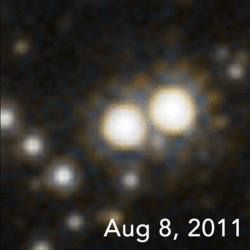Astronomy:OGLE-2011-BLG-0462
 Animated astrometric observations of the gravitational microlensing of OGLE-2011-BLG-0462/MOA-2011-BLG-191 | |
| Object type | black hole |
|---|---|
| Other designations | MOA-2011-BLG-191 |
Observation data (Epoch 2455874.50236 (2011-11-09.00 UT)) | |
| J2000.0 (17:51:40.19) | |
| Declination | J2000.0 (-29:53:26.3) |
| Distance | 5610 light years (LY) |
| Mass | 3.5-8.0 sun |
| Estimated age | 100 million years old |
OGLE-2011-BLG-0462, also known as MOA-2011-BLG-191, is a stellar-mass black hole isolated in interstellar space. OGLE-2011-BLG-0462 lies at a distance of 5,000 light years in the direction of the galactic bulge in the constellation Sagittarius. The black hole has a mass between 3.6 and 8.0 M☉ [1] The discovery of OGLE-2011-BLG-0462 makes this object the first truly isolated black hole found. [2] [3] [4] OGLE-2011-BLG-0462 was discovered through microlensing when it passed in front of a background star that was 20,000 light years away from Earth. The black hole's gravity bent the star's light, causing a sharp spike in brightness that was detected by the Hubble Space Telescope. It took six years to confirm the existence of OGLE-2011-BLG-0462. Its initial kick velocity has been estimated to have an upper limit of 100 km/s.[5][6] No significant X-ray emission has been detected from gas accreting onto the black hole indicating that it is truly isolated. [7]
See also
References
- ↑ Lam, C. Y.; Lu, J. R. (2023). ""A Reanalysis of the Isolated Black Hole Candidate OGLE-2011-BLG-0462/MOA-2011-BLG-191"". The Astrophysical Journal 955 (2): 116. doi:10.3847/1538-4357/aced4a. Bibcode: 2023ApJ...955..116L.
- ↑ Lam, Casey Y. et al. (2022). ""An Isolated Mass-gap Black Hole or Neutron Star Detected with Astrometric Microlensing"". ApJL 933 (1): L23. doi:10.3847/2041-8213/ac7442. Bibcode: 2022ApJ...933L..23L.
- ↑ Sahu, Kailash C.; Anderson, Jay; Casertano, Stefano; Bond, Howard E.; Udalski, Andrzej; Dominik, Martin; Calamida, Annalisa; Bellini, Andrea et al. (2022-01-01). "An Isolated Stellar-mass Black Hole Detected through Astrometric Microlensing". The Astrophysical Journal 933 (1): 83. doi:10.3847/1538-4357/ac739e. Bibcode: 2022ApJ...933...83S.
- ↑ "2011-BLG-0462". http://ogle.astrouw.edu.pl/ogle4/ews/2011/blg-0462.html.
- ↑ Panjkov, Sonja (2023-01-27). "The Peculiar Nature of Black Hole Birth Kicks" (in en-US). https://astrobites.org/2023/01/27/template-post-12/.
- ↑ Andrews, Jeff J.; Kalogera, Vicky (2022-05-01). "Constraining Black Hole Natal Kicks with Astrometric Microlensing". The Astrophysical Journal 930 (2): 159. doi:10.3847/1538-4357/ac66d6. ISSN 0004-637X. Bibcode: 2022ApJ...930..159A.
- ↑ Mereghetti, Sandro; Sidoli, Lara; Ponti, Gabriele; Treves, Aldo (2022-06-01). "X-Ray Observations of the Isolated Black Hole Candidate OGLE-2011-BLG-0462 and Other Collapsed Objects Discovered through Gravitational Microlensing". The Astrophysical Journal 934 (1): 62. doi:10.3847/1538-4357/ac7965. Bibcode: 2022ApJ...934...62M.
 |

